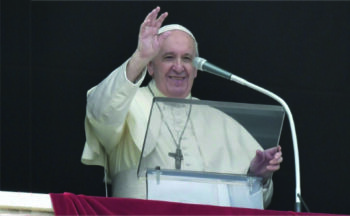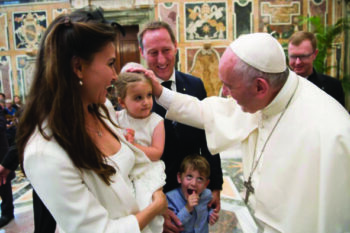Healing the World
 Extracts from the Pope’s catechesis on healing the world
Extracts from the Pope’s catechesis on healing the world
In the face of the pandemic and its social consequences, many risk losing hope. In this time of uncertainty and anguish, I invite everyone to welcome the gift of hope that comes from Christ. It is he who helps us navigate the tumultuous waters of sickness, death and injustice, which do not have the last word over our final destination.
The pandemic has exposed and aggravated social problems, above all, that of inequality. Some people can work from home, while this is impossible for many others. Certain children, notwithstanding the difficulties involved, can continue to receive an academic education, while this has been abruptly interrupted for many, many others.
A sick economy
These symptoms of inequality reveal a social illness. It is a virus that comes from a sick economy. The sickness is the fruit of unequal economic growth that disregards fundamental human values. In today’s world, a few rich people possess more than all the rest of humanity.
This is an injustice that cries out to heaven! At the same time, this economic model is indifferent to the damage inflicted on our common home.
We are close to exceeding many limits of our wonderful planet, with serious and irreversible consequences, from the loss of biodiversity and climate change to rising sea levels and the destruction of tropical forests. Social inequality and environmental degradation go together and have the same root (cf. Laudato Si’, 101) — the sin of wanting to possess and wanting to dominate one’s brothers and sisters, of wanting to possess and dominate nature and God himself. But this is not the design for creation.
When the obsession to possess and dominate excludes millions of persons from having primary goods, when economic and technological inequality are such that the social fabric is torn and when dependence on unlimited material progress threatens our common home, then we cannot stand by and watch. With our gaze fixed on Jesus (cf. Hebrews 12:2) and with the certainty that his love is operative through the community of His disciples, we must act all together, in the hope of generating something different and better. Christian hope, rooted in God, is our anchor. It moves the will to share, strengthening our mission as disciples of Christ, who shared everything with us.
A world in crisis
The pandemic has put all of us in crisis. After the crisis, will we continue with this economic system of social injustice and depreciating care for the environment, for creation, for our common home? May the Christian communities of the twenty-first century recover this reality – care for creation and social justice. They go together and bear witness to the Lord’s Resurrection. If we take care of the goods that the Creator gives us, if we put what we possess in common in such a way that no one is in need, then we would truly inspire hope to regenerate a more healthy and equal world.
The children
In conclusion, let us think about the children. How many children today are dying of hunger because wealth is not evenly distributed, because of the economic system? And how many children today do not have the opportunity for education for the same reason?
May this image of children in want due to hunger and the lack of education help us understand that after this crisis we must do better.
Source: Vatican News, General Audience,
26 August 2020
“Lord, save me”
When we have strong feelings of doubt and fear and we seem to be sinking, and when everything becomes dark, we must not be ashamed to cry out like Peter, “Lord, save me”.
This Gospel narrative is an invitation to abandon ourselves trustingly to God in every moment of our life, especially in times of trial and turmoil. Believers must learn to knock on God’s heart, on Jesus’ heart. In dark moments, in sad moments, he is well aware that our faith is weak. All of us are people of little faith — all of us, myself included. Our faith is weak, but the Lord is present beside us lifting us back up after our falls, helping us grow in faith.
Source: Crux, Commentary on Matthew 14:22-33, Angelus address, 9 August 2020

 Entries(RSS)
Entries(RSS)